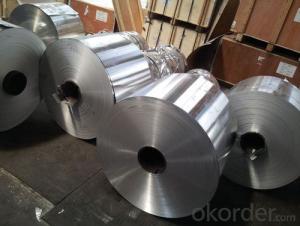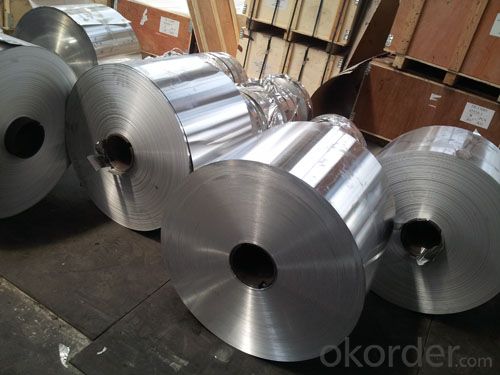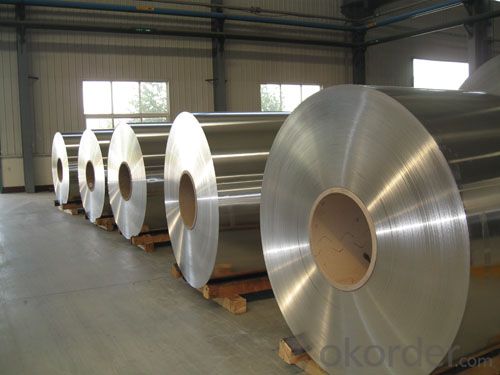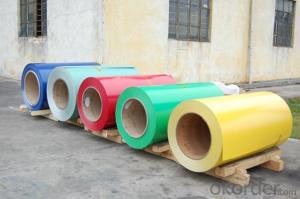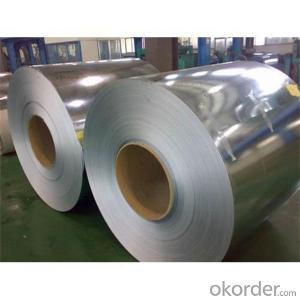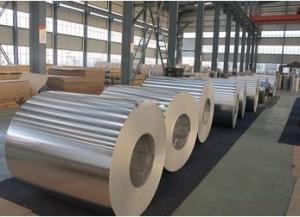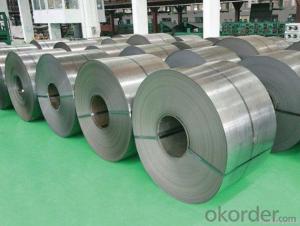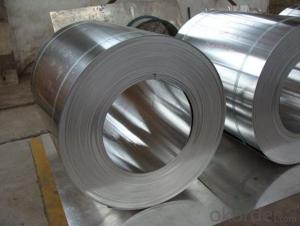1050 Aluminum Coil for Sale - Coated Aluminum Coil/Roll for Aluminium Furniture
- Loading Port:
- Shanghai
- Payment Terms:
- TT OR LC
- Min Order Qty:
- 2 m.t.
- Supply Capability:
- 50000 m.t./month
OKorder Service Pledge
OKorder Financial Service
You Might Also Like
Specification
Coated Aluminium Coil/Roll For Aluminium Fuiniture
Description
Alloy | 1060, 1100, 3003, 8011, etc. |
Temper | H16, H18, H24, H26, H28 |
Thickness | From 0.05mm to 3.0mm |
Width | Standard width:1240mm |
Special width:1300mm, 1520mm, 1570mm, 1595mm | |
Diameter | Standard dia:1200mm |
Interior dia:150mm,405mm,505mm | |
Weight | 2.5 T/coil,3.0 T/coil |
Coating | PE, PVDF, ACRYLIC |
Surface | Embossed, mill finish, coated |
Color | AS to code RAL |
Gloss | 10-90%(EN ISO-2813:1994) |
Coating Thickness | PE: more than 18 micron |
PVDF: more than 25 micron | |
Coating Hardness(pencil resistance) | More than 2h |
Coating adhesion | 5J (EN ISO-2409:1994) |
Impact Resistance | No peeling or cracking(50 kg/cm,ASTMD-2794:1993) |
Flexibility(T-bend) | 2T |
MEK resistance | More than 100 |
Advantage | 1.High temperature resistant 2.Weathering resistant 3.Scrubbing resistant 5.Acid or alkali proof 6. Fireproof 7.Light weight material is easy to construct and install |
Out package | Wooden splint with export standard |
Application | ACP, wall cladding, facades, roofs and canopies, ceilings, signboards, blind window, display platforms, electrical panels, etc |
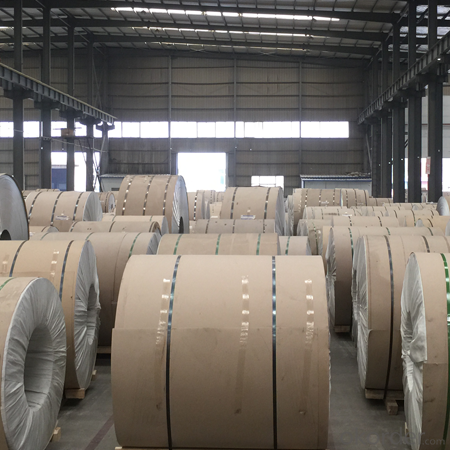
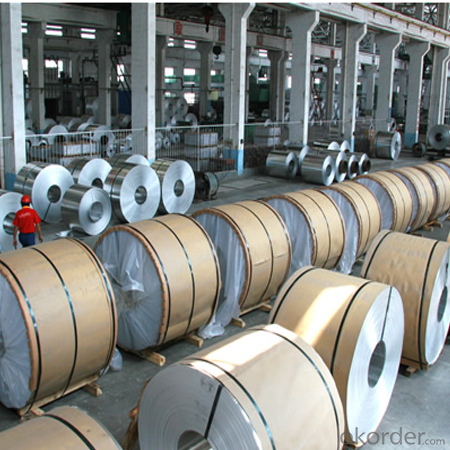
Manufacturing
Decoiler → Accumulator →Tension Leveler →Acid & Alkali Cleaner → Rinse →Conversion Treatment → Priming coater →Infrared Curing Oven →Main coater →Floatation Curing Oven →Strippable Film Applicator → Exit Accumulator → Recoiler
FAQ
--Q: Do you provide free samples?
--A: Yes, free samples will be sent to you on freight at destination.
--Q: Can I get your latest products catalogue?
--A: Yes, it will be sent to you in no time.
--Q: What is the MOQ?
--A: 2 tons
--Q: What are your payment terms?
--A: We accept L/C, T/T.
--Q: What kinds of alloy can you supply?
--A: 1000 series: 1050, 1060, 1070, 1100, 1145, 1200
3000 series: 3003, 3004, 3105, 3104
5000 series: 5052, 5083, 5754, 5182
6000 series: 6061, 6063, 6062, 6063
8000 series: 8011, 8021
--Q: What kinds of temper can you supply?
--A: O-H112: O,H12,H14,H16,H18,H22,H24,H26,H,32,H34,H111,H112
T3, T4, T6
- Q: How do aluminum coils contribute to energy-efficient lighting installations?
- The energy efficiency of lighting installations is greatly enhanced by the use of aluminum coils. Firstly, aluminum, being highly conductive, effectively transfers heat away from the lighting system. This prevents heat accumulation, which can negatively impact the performance and lifespan of the lighting fixtures. By effectively dissipating heat, aluminum coils ensure that the lights operate at their highest efficiency by maintaining optimal operating temperatures. Furthermore, aluminum coils are lightweight, which makes them easier to handle and install. This reduces the overall weight of the lighting fixtures, making them more convenient to mount and manipulate during installation. The reduced weight also leads to lower energy consumption during transportation and installation, thus promoting long-term energy efficiency. Additionally, aluminum coils are highly durable and resistant to corrosion, making them ideal for lighting installations exposed to various environmental conditions. This durability reduces the need for frequent replacements or repairs, resulting in lower energy consumption associated with maintenance. Moreover, aluminum is a recyclable material, meaning that the coils can be easily reused or repurposed at the end of their life cycle. Recycling aluminum requires significantly less energy compared to producing new aluminum, leading to a reduced carbon footprint and overall lower energy consumption. In summary, aluminum coils offer numerous benefits in terms of energy efficiency for lighting installations. Their efficient heat dissipation, lightweight nature, durability, and recyclability contribute to optimized performance, reduced energy consumption, and a more sustainable lighting solution.
- Q: I have a couple aluminum baking sheets, and when i wash them, then dry them with a towel, it turns the towel black? why is this? are these still ok to use? Ive been putting one of those silicone baking sheets or parchment paper on the sheets because of this. but i cant really do that with the cake pan. so how do i stop it from doing this?
- idk
- Q: What is the average lifespan of aluminum coils?
- The lifespan of aluminum coils can differ based on a range of factors, including the quality of the aluminum, the environmental conditions they are subjected to, and the level of maintenance they receive. On average, aluminum coils typically endure for approximately 15 to 20 years. However, by implementing proper installation procedures, conducting regular cleaning, and performing maintenance tasks, the lifespan of aluminum coils can be extended further. It is vital to emphasize the significance of regular inspections and upkeep in order to enhance the longevity of aluminum coils and guarantee optimal performance.
- Q: Why do we need aluminum when cooking in the oven at all.
- Foil keeps meat from drying out and hastens cooking time. Also keeps juices from spattering all over the inside of your oven. Plus, when you line a pan with foil, easier to clean pan, especially if you are baking something like cheesy scalloped potatoes.
- Q: Automotive aluminum coil, using GB H22, what brand, what are the main ingredients?
- 5754-H22 aluminum sheet has the characteristics of medium strength, good corrosion resistance, weldability and easy processing. It is a typical alloy in Al-Mg (mg Al alloy) alloy. In the corresponding foreign brands for AlMg3, 5754 different heat treatment is the automobile manufacturing industry (car door, mould, seals), main materials used for canning industry
- Q: What are the various applications and purposes of aluminum coil in different industries?
- <p>Aluminum coil is widely used in numerous applications due to its lightweight, corrosion resistance, and high strength. It is commonly used in construction for roofing and siding, in the automotive industry for body panels and heat exchangers, and in the packaging industry for food and beverage cans. Aluminum coil is also utilized in electrical applications such as transformers and wiring, and in the manufacturing of everyday items like foil and cookware. Its versatility makes it a popular material in various industries.</p>
- Q: What are the common maintenance practices for aluminum coils?
- Some common maintenance practices for aluminum coils include regular cleaning, inspection for damage or corrosion, and ensuring proper airflow around the coils. Cleaning the coils is important to remove dirt, debris, and other contaminants that can accumulate over time. This can be done by gently brushing or vacuuming the coils, or using a mild detergent and water solution to clean more stubborn dirt. It is important to avoid using harsh chemicals or abrasive materials, as they can damage the aluminum surface. Inspecting the coils for damage or corrosion is also essential for maintaining their performance and longevity. Any signs of physical damage, such as dents or bends, should be addressed promptly to prevent further deterioration. Additionally, corrosion can occur due to exposure to moisture or chemicals, so it is important to check for any signs of rust or discoloration. If corrosion is present, it should be treated and the cause of the corrosion should be addressed to prevent future damage. Proper airflow around the coils is crucial for efficient operation. Obstructions or blockages in the surrounding area should be cleared to ensure adequate air circulation. This can include removing any debris or objects that may be restricting airflow, as well as ensuring proper spacing between the coils and nearby objects. Additionally, regular inspection of the air filters and ventilation system is important to prevent any restrictions that could impact airflow. Overall, regular cleaning, inspection, and maintenance of aluminum coils can help ensure their optimal performance and prolong their lifespan. It is recommended to follow manufacturer guidelines and consult with professionals if any issues or concerns arise.
- Q: What are the potential health risks associated with aluminum coils?
- Aluminum coils are commonly used in HVAC systems for their durability and heat transfer properties. While they are generally considered safe, there are potential health risks associated with aluminum coils if certain conditions are not met. One of the primary concerns is the potential for aluminum to leach into the air or water supply. Aluminum is a known neurotoxin, and excessive exposure to it can lead to various health issues, particularly in individuals with pre-existing conditions such as kidney disease or weakened immune systems. However, the amount of aluminum that may leach from coils is typically minimal and unlikely to pose a significant risk to most people. Another potential health risk is related to the accumulation of dust, dirt, and other particles on the aluminum coils. These particles can act as a breeding ground for bacteria, mold, and other allergens, which may negatively affect indoor air quality. If not properly maintained and cleaned, these contaminants can cause respiratory problems, allergies, and even infections in susceptible individuals. Furthermore, aluminum coils can be a source of electromagnetic fields (EMFs) due to the electric currents passing through them. While the health effects of EMF exposure are still a topic of ongoing research, some studies suggest a potential link between high levels of EMFs and certain health conditions, including cancer. However, it is important to note that the levels of EMFs emitted by aluminum coils are generally considered to be within safe limits and unlikely to pose significant health risks. To mitigate these potential health risks, it is crucial to ensure proper maintenance and cleaning of aluminum coils. Regular inspections, professional cleaning, and changing air filters can help prevent the accumulation of contaminants and maintain good indoor air quality. It is also recommended to consult with HVAC professionals to ensure proper installation and maintenance of the coils, minimizing the risk of aluminum leaching or excessive EMF exposure. In conclusion, while there are potential health risks associated with aluminum coils, they are generally considered safe when properly maintained. Taking necessary precautions and following recommended maintenance practices can help minimize any potential health concerns associated with aluminum coils in HVAC systems.
- Q: Are aluminum coils resistant to vibration?
- Aluminum coils, typically, exhibit resistance to vibrations. Being lightweight and flexible, aluminum possesses the capability to absorb vibrations and alleviate their effects. Moreover, aluminum coils find extensive usage in crucial areas where vibration resistance holds significance, such as HVAC systems, automotive components, and electrical transformers. The commendable strength-to-weight ratio of aluminum further contributes to its capacity to endure vibrations without distortion or fracturing. Nevertheless, the precise degree of vibration resistance could vary depending on the distinctive design and construction of the aluminum coil.
- Q: How are aluminum coils used in the manufacturing of signage?
- Aluminum coils are commonly used in the manufacturing of signage as they offer durability, flexibility, and weather resistance. These coils are typically cut, shaped, and molded into desired sign shapes and sizes. They can be used as a base material for various types of signage, including billboards, outdoor signs, and traffic signs. The lightweight nature of aluminum coils makes them easy to handle and install, while their corrosion-resistant properties ensure the longevity of the signage.
Send your message to us
1050 Aluminum Coil for Sale - Coated Aluminum Coil/Roll for Aluminium Furniture
- Loading Port:
- Shanghai
- Payment Terms:
- TT OR LC
- Min Order Qty:
- 2 m.t.
- Supply Capability:
- 50000 m.t./month
OKorder Service Pledge
OKorder Financial Service
Similar products
Hot products
Hot Searches
Related keywords
